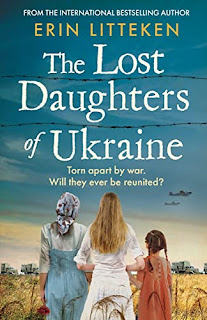I’ve spent this beautiful summer immersed in Ukraine’s 20th century troubles. I bookended Maya’s Memories, an excellent locally-written memoir, with Erin Litteken’s two recent best-selling novels, The Memory Keeper of Kyiv and The Lost Daughters of Ukraine. Made for some dark headspace.
The fire-bombing of Dresden, as portrayed in the second half of The Lost Daughters of Ukraine, seemed particularly harsh. With friends affected by the wildfires around Kelowna, I’ve been quite aware of the side effects of smoke. My friends had to evacuate their homes and find shelter elsewhere … worried that their homes might burn. Imagine also being hungry, homeless and unable to trust those around you. |
| Bundesarchiv_Bild_146-1994-041-07,_Dresden |
Litteken’s The Lost Daughters of Ukraine portrayed relentless suffering. From Soviet to Nazi occupation to indiscriminate bombing by the Allies and years of homelessness. It was difficult to read and I’m sure it was difficult to research and write. But it was even harder to live through.
My weekly English sessions with current Ukrainian refugees, escaping a new war, reinforces the printed stories I’ve been reading. Every day, news headlines tell of further atrocities ... of lives turned upside down, of families separated, of uncertain futures. It keeps happening.Litteken’s two novels, inspired by family history, must have been a relief to get out. I know that’s how I’ve felt with my family stories. In the Author’s Note, Litteken writes, “This story—much of it dealing with painful, brutal history and with my own family’s traumas—was difficult to write. But even in the midst of the darkness, I found glimpses of light.” (p. 400) She goes on to mention that by ignoring national identities and seeing humans first, we can learn from the past. John Lennon said it succinctly in his song, Imagine.
“Imagine there's no countries
It isn't hard to do
Nothing to kill or die for
And no religion, too”
My friends tell me I should stop reading this stuff. That I should lighten up. Ha. I should. And I try. But I can’t ignore what’s happening in our world and I can’t ignore the past that has contributed to the present. Because it’s all connected.



No comments:
Post a Comment